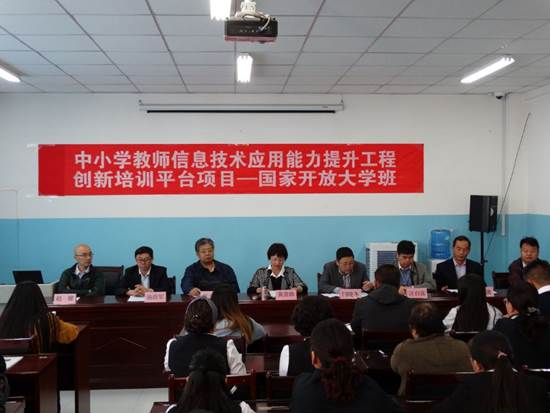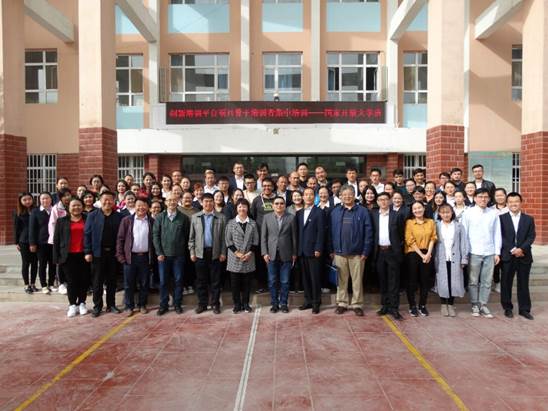 On 27 September 2018, a launch meeting for the Innovative Training Platform for Improving the Information Technology Application Abilities of Primary and Secondary School Teachers, the Ministry of Education’s (MOE) targeted poverty alleviation programme for three regions, including Tibet, four autonomous prefectures in southern Xinjiang autonomous region and Tibetan regions in the four provinces of Yunnan, Sichuan, Gansu and Qinghai, and three autonomous prefectures, including Linxia prefecture in Gansu province, Liangshan prefecture in Sichuan province, and Nujiang prefecture in Yunnan province, was held in Shaya County, Akesu, Xinjiang.
On 27 September 2018, a launch meeting for the Innovative Training Platform for Improving the Information Technology Application Abilities of Primary and Secondary School Teachers, the Ministry of Education’s (MOE) targeted poverty alleviation programme for three regions, including Tibet, four autonomous prefectures in southern Xinjiang autonomous region and Tibetan regions in the four provinces of Yunnan, Sichuan, Gansu and Qinghai, and three autonomous prefectures, including Linxia prefecture in Gansu province, Liangshan prefecture in Sichuan province, and Nujiang prefecture in Yunnan province, was held in Shaya County, Akesu, Xinjiang.
The Open University of China (OUC) programme to assist Aksu region and the training of backbone teachers was also launched.

Huang Guizhen, executive secretary of the Expert Working Group for the Training of National Teachers and Principals in Primary and Secondary Schools, MOE Teachers’ Affairs Division; Zhang Zhijun, head of the OUC Poverty Alleviation Office; Wang Qifu, Director of the OUC Training School; Yan Xiaodong, associate researcher from the Teachers’ Work Office under the Educational Department of Xinjiang Autonomous Region; and Yang Hongjun, Party secretary of the Institute of Education at Akesu, attended the meeting and delivered speeches. The meeting was chaired by Wang Ningbo, Party secretary of the Education Bureau of Shaya County.
In accordance with the guiding ideology of "based on school conditions, classification guidance, led by demonstration, and spreading from one spot to more areas", in three years, the programme has trained 2,609 teachers in 85 primary and secondary schools in Shaya County. The basic goal of "one outstanding lesson by one teacher and one lesson with one famous teacher" has been achieved. Three backbone teaching teams in subject teaching, education informatisation, and teaching research and training guidance have been trained for Shaya County. The project has focused on building a number of demonstration schools for information technology application and using them to lead a number of township schools, with the effect of achievement interactive development among neighbouring schools. The information technology application abilities of teachers in primary and secondary schools in Shaya County have been enhanced. The quality and effect of classroom teaching has been improved and the transformation of students' learning models has been promoted. No matter their foundation in information technology, the programme will help teachers with the preliminary, integrative, and deepened application of information technology through a combination of online "self-help selective courses + network-based training/teaching workshops" and offline "school-based training/subject teaching and research + expert delivery of teaching to households by experts.” In 2018, the work will focus on exploring models, setting up models, and setting up examples so as to form experiences that can be summarised, replicated, and popularised, laying a solid foundation for the realisation of the objectives for the next two years.
Huang Guizhen conveyed the main spirit of the National Education Congress held on 10 September 2008 and the Opinions of the State Council of the CPC Central Committee on the Comprehensive Deepening of the Reform of Teachers' Team Construction in the New Era (No. 4 of Zhongfa, 2018). She stressed that building a powerful country with strong educational resources is a fundamental part of the great rejuvenation of the Chinese nation. The CPC Central Committee, with Comrade Xi Jinping as its core, attaches great importance to the cause of education and raises the cultivation of teachers in the new era to unprecedented heights. We should understand and thoroughly implement the spirit of the National Education Congress and the Fourth Document of the CPC Central Committee, use implementation as an opportunity to enhance the innovative training platform with information technology, successfully implement top-level design, innovate training methods, and form a systematic training system for teachers. It is hoped that the OUC, the Education Department of Xinjiang Uygur Autonomous Region, the Aksu Regional Education Bureau, and the Education Bureau and primary and secondary schools at Shaya County will attach great importance to the training programme from a political point of view, carefully plan and organise the training, clarify the responsibilities of all parties, establish a cooperative working mechanism, include coordination in the promotion work, pay attention to real-time results, and explore different development models and implementation paths for improving the information technology application abilities of primary and secondary school teachers, which are targeted at school-based applications and can be duplicated and popularised.
After the meeting, Professor Zhao Jian of Northwest Normal University and the programme leaders of the OUC’s Training School carried out training programs. The secretaries, principals, and backbone teachers of the first batch of demonstration schools in Shaya County, as well as the teaching and research staff of the county’s teaching and research office, participated in the ceremony and training programme.

By OUC School of Vocational Education and Training